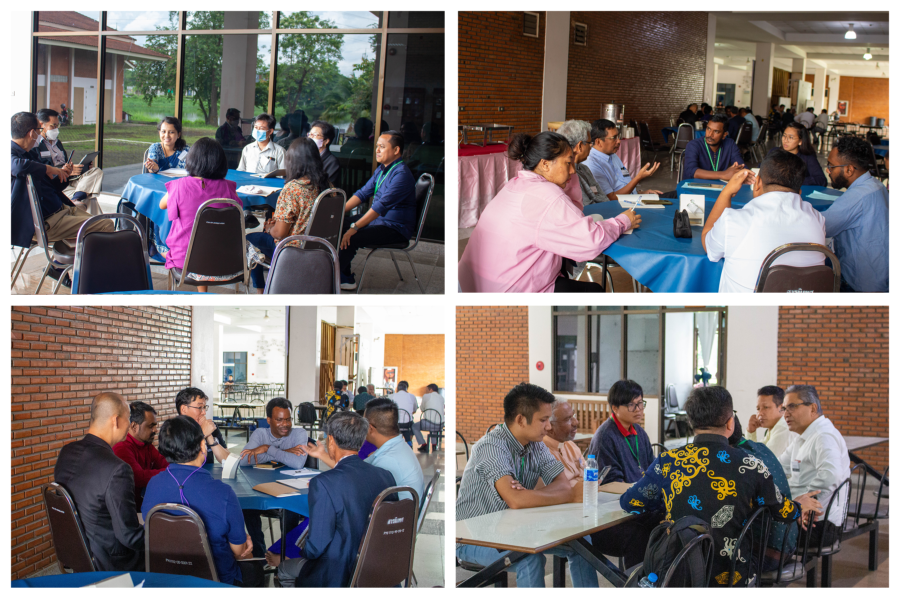CCA Consultation on faith, health, and healing discerns ways for churches to serve as healing agents
 Participants in Group Discussions
Participants in Group Discussions
Chiang Mai: Medical professionals, pastoral care providers, and leaders of churches, ecumenical councils, and health-related organisations shared best practices and discussed ways for Asian churches to effectively engage in the holistic healing ministry on the second day of the international consultation on faith, health, and healing organised by the Christian Conference of Asia (CCA).
Dr Regowo from the Indonesian Christian Association for Health Services (ICAHS) presented the experiences of how ICAHS has been providing holistic care services to the community since 1983. ICAHS, also known in Indonesia as PELKESI, comprises 75 Christian hospitals, 20 health education facilities, and several Christian healthcare and medical professionals. He encouraged Asian churches to develop holistic health care services, beyond the idea of establishing a hospital or clinic, and to develop programmes that provide health education and health monitoring for congregations and the surrounding communities. Instead of charity, Dr Regowo advised churches to promote volunteerism and the growth of social entrepreneurship schemes.
During the session titled ‘Models of Christian Witness in Health and Healing Ministry: Continuum of Care’, Dr Wang Wen-Fu of Changhua Christian Hospital under the Presbyterian Church in Taiwan (PCT) shared the church’s ministry to the elderly who were vulnerable to dementia.
The PCT, which is also known as “friendly churches to the elderly”, provided not only pastoral care and visitation, but also classes for the elderly in arts, music, gardening, exercise, and mental gymnastics. The programme’s tagline, “Church Medical Care, Grace for the Elderly!” encouraged church members and leaders to “build a kind of friendly church calling on people to become caregivers for those challenged by dementia”.
Rev. Paoina Bara Pa of the Evangelical Church from West Timor, Indonesia spoke about her work with traditional medicine in the community, describing it as “the oldest form of treatment in human history that has enriched the development of modern culture in the field of health today”. She explained that traditional medicine preserved relationships with God, nature, and people of various faiths. Faith, health, and healing, according to Rev. Bara Pa, were an intergenerational heritage derived from teachings, ways of life, and experience. ‘Rukunu’ herbal oil was a traditional heritage from ancestors as local wisdom for healing, and was part of women's wisdom and experience as traditional healers, she continued.
Ms Arshinta from the Yayasan Kristen untuk Kesehatan Umum (YAKKUM), also known as the Christian Foundation for Public Health in Indonesia, a church-based health advocacy organisation founded in 1950, presented its community-based mental health rehabilitation programme that included people with psychosocial disabilities, caregivers, villagers, and the primary health care centres. She highlighted efforts to persuade legislators at all levels to adopt mental health policies. She also mentioned the ‘Speak Your Mind’ programme, which encouraged students to express their concerns to prevent the worsening of mental health problems and suicide rates in their community.
Dr R.L. Sanghluna of the Presbyterian Church in India spoke about the mission of the Synod Hospital in Durtland, Mizoram, India, in providing the best care to patients regardless of religion or economic status. The health facility, founded in 1928 by Welsh missionaries, served patients with chronic incurable diseases, HIV and AIDS patients, and substance abuse patients. He concluded his presentation with a call to church leaders and Christian medical practitioners to welcome the rejected, to be compassionate, and to be servant-like in the ways of Jesus.
Participants discussed ‘Church and Healing Ministry’ in small groups. From the discussions emerged how the church could be an agent of healing in the areas of focus, namely, pandemics (COVID-19), communicable diseases (HIV, tuberculosis, malaria), non-communicable diseases (chronic illness), disability, sexual and reproductive health, and environmental health.
The second day’s sessions affirmed Jesus’ promise of a full life (John 10:10), adhering to holistic, community-based, and church-based healing that assigns value to all aspects of healing: body, mind, spirit, and soul.










